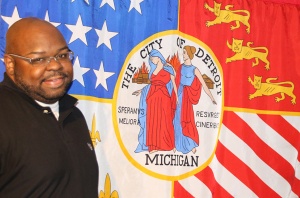

Keith McCallum has pride in his childhood neighborhood. He talks about the flowers he helped his grandma, who lived next door, plant and the community cookouts, where his Aunt Karen would make the best BBQ sauce. And the teachers he had at his childhood school—he can still rattle off their names.
But when the urban and regional studies student drives down the street of his former eastside Detroit home today, things have changed.
His beloved school, Jane Cooper Elementary, closed in 2007 and was demolished in 2010. His grandma's house burned when the one next door caught on fire. Instead of planted flowers, overgrown brush on vacant lots and dilapidated homes are a prominent feature.
“I knew things were transitioning when I was a kid, but I didn’t know why,” he said. “I’m glad I have professors who are helping me connect the dots. I’m also learning about how resilient Detroit is. It will come back this time, just like it has many times before.”
McCallum, along with nearly 30 of his peers, is enrolled in the Studies in Detroit Culture course.
The interdisciplinary course explores—from the 1800s to present day—the political, social and cultural history of Detroit by examining ways various groups and classes have interacted with, and been shaped by, structures of power and influence.
In addition to class lectures and discussion led by Assistant Professors Keith Dye and Terri Laws, students take field trips to the Charles H. Wright Museum of African American History, University of Detroit-Mercy to see the Broadside Press Poets’ Theatre and more.
Dye, a life-long Detroiter, said every topic points back to the resilience of the city.
“Detroit has weathered the storm of many events and a few major riots—1833, 1863, 1943, 1967,” said Dye, who remembers witnessing the 1967 riots. “Professor Laws and myself want to show students how Detroit emerged sociologically, culturally, artistically. But also how it’s changed, what brought about the change, and the effects of the change. There may be turmoil here, but there is also hope. If I had to use one word to describe Detroit, I’d say ‘resilient.’”
For more than 35 years, students have been learning about the Motor City through this campus course.
Martin Hershock, dean of the College of Arts, Sciences, and Letters, said the course was one of his favorites as an undergraduate.
“Though somewhat aware of some of Detroit's historical and cultural heritage, this course wove it all together for me and showed me what a unique and vibrant city that I was part of and how that uniqueness spilled out in so many different forms—poetry, music, art, literature, architecture, identity, history,” said Hershock, who has lived in or near Detroit his whole life. “The class made me much more self aware and attuned to the city's proud history as well as to the darker side of that history and its still festering legacy. For me it made me much more eager to become involved and to embrace my city, warts and all.”
McCallum said he embraces the city and hopes the change he’s seeing will be for the better. Most recently, he’s seen signs of the current Detroit comeback in his old neighborhood too.
Detroit businessman Manuel "Matty" Moroun recently publicized that a 500,000 square-foot-logistics center will be built on vacant land within walking distance of where McCallum’s childhood home once stood. After that announcement was made, he said new roads and sidewalks showed up in the neighborhood.
“It remains to be seen what happens next, but I’m glad to see new opportunities. From what I’ve seen and learned, access to opportunities can make or break a city,” McCallum said. “After taking this course, I drive around and see things differently. I understand a little bit more. But the pride is the same. Detroit is my city.”





